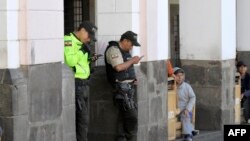The rejection by the Constitutional Court of Ecuador of the cases presented by members of opposition parties together with social organizations to have President Guillermo Lasso’s decision to dissolve the National Assembly by decree declared unconstitutional, paves the way for early elections.
“As a consequence of the decision to reject the unconstitutionality claims, the requests that the Court adopt precautionary measures in order to provisionally suspend the effects of the contested Decree were also rejected,” the Court said in a statement on Thursday.
Lasso on Wednesday invoked the so-called “cross death,” a measure provided for in the Constitution, which allows the president to call early elections for both his position and the assembly under certain circumstances, including if the actions of the Legislature are blocking the functioning of the government.
The president argued that when taking the measure he was based on what he called a serious political crisis and an internal commotion in Ecuador.
“Let us remember that the court is the guardian of the Constitution and the Constitution clearly establishes that these causes are verified in the judgment of the President of the Republic,” said the constitutional lawyer, Emilio Suárez.
Ecuador’s electoral court had also said on Thursday that the early elections could take place on August 20. In the event that a second round is necessary, this would be held on October 15.
After the ruling of the Constitutional Court, the electoral court approved the start of the electoral process and its head, Diana Atamaint, said that now no one can obstruct the elections.
“The deadlines are those that will have to be governed by a special regulation for this, for example, the debate will have to be done on the day the campaign begins. We have programmed that Sunday, October 15, would be the second round,” said Atamaint.
Lasso was facing an impeachment attempt by opposition politicians over accusations that he ignored warnings of embezzlement related to a contract at the state oil transport company Flopec. The president has denied the accusations.
For now, Lasso will remain in office and rule by decree until his successor and a new legislature are elected, in accordance with Ecuador’s constitution.
Before the Constitutional Court decision, lawmakers in the dissolved National Assembly said they would respect the court’s decision, even if it upheld the president’s actions.
Those elected in the early elections would only be in office until the regular elections are held in 2025.
Lasso is not the only Ecuadorian president who has not concluded the term for which he was elected in Ecuador since the country resumed its democratic life in 1979.
Rafael Correa took office in 2007 and was due to finish his term in 2011, but he convened a Constituent Assembly that ended in 2008, which allowed him to be a candidate again and won another presidential term that ended with re-election in 2017.
Other cases of presidents who did not complete their term
1-Jaime Roldós died in 1981, his position ended in 1984.
2-Abdalá Bucaram took office in 1996, he was dismissed by the Assembly for mental incapacity in 1997, less than six months after being in office.
3-Rosalía Arteaga replaced him and only lasted 3 days as president, the Assembly replaced her.
4-Jamil Mahuad took office in 1998 and was dismissed in 2000 for applying dollarization.
5-Lucio Gutierrez took office in 2003 and was dismissed in 2005 for having intervened in the dismissal of various judges of the National Court of Justice.
[Con reporte de Giselle Jacome desde Quito. Contiene información de Reuters]
Connect with the Voice of America! Subscribe to our channel Youtube and activate notifications, or follow us on social networks: Facebook, Twitter and Instagram.















